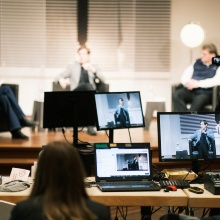With his works “Measuring the World”, “Tyll”, and “Me and Kaminski”, Daniel Kehlmann has achieved both national and international fame. He came to the state capital at the invitation of a partner network consisting of the International Center for Cultural and Technological Studies (IZKT) at the University of Stuttgart, the Literaturhaus Stuttgart, and the Protestant Educational Center Hospitalhof Stuttgart. In his speech, entitled “My Algorithm and Me”, he reported on his tour into the future - due to the pandemic, not in the Liederhalle in front of a large audience, but online, live from the Literaturhaus.
“It was a beautiful day in summer.” – “The sun shone brightly on the green grass and flowers of the garden, but there were no birds to sing or insects to hum.” That’s how it all started. Daniel Kehlmann provided the beginning, his co-author, an algorithm, produced the continuation. The exclusive writing duo formed in Silicon Valley in early 2020 at the invitation of a company worked in a ping-pong style on a story. Behind the experiment was the question: Can an algorithm write stories?
Like the genie out of the bottle
“I didn’t hesitate for a second to accept the offer,” said Daniel Kehlmann but admitted to having been a little disappointed in his writing partner after all. Like in a science fiction novel, he had expected to meet a small humanoid being in a metallic box, or something similar to the robot woman in Fritz Lang’s movie “Metropolis”. Instead, he never saw his co-author CTRL in person, who appeared “like the genie out of the bottle” when he “called him” on the computer. Presumably, CTRL’s location is some air-conditioned server farm in a secret place in some salt desert, Kehlmann guessed.
A soft spot for the surreal
To get to the point first - there is no short story. CTRL, the “effective master of the beginning”, as Daniel Kehlmann describes it, turned out to be a friend of the fragment and the surreal, whether for prose, poem, drama, or play. After a few pages, although often with wondrous twists and turns and also suspense, that was it. The algorithm loses the plot. “Clearly, the Kafkaesque is more to CTRL’s liking than Dickens,” Kehlmann says and notes that the conversational inconsistencies from his co-author might well be realistic, as people talk past each other all the time.
“Straight to the heart”
The experiment failed. With “My Algorithm and Me”, however, there is still a story: namely the one about the writing duo of man and machine. The text passages alone that Kehlmann is reading to the audience - and the way he is reading them - make you want to hear more. “We are very pleased that Daniel Kehlmann accepted the invitation,” said Dr. Elke Uhl, Managerial Head of IZKT. Her colleague, Dr. Felix Heidenreich, remarked: “It was a great idea to invite a writer.” Kehlmann’s art of storytelling and his subtle irony were just as impressive as all the philosophical questions about consciousness and intelligence that came up in the subsequent discussion session with Prof. Michael Resch, Director of the High-Performance Computing Center Stuttgart, and in the workshop discussion on the following day. With all his thoughts and ideas he went straight to the heart at our technically-oriented university and helped us to establish an intra-university discourse across all ages and institutes,” Elke Uhl explains.
A “magical” machine for secondary exploitation
“I never built up an emotional relationship with CTRL,” Kehlmann recalled, as his counterpart had not even been able to convincingly simulate consciousness. However, according to Kehlmann, there was something “magical” about the “silicone-based intelligence”. It was difficult for him to resist the desire to edit its sentences, Kehlmann admitted, and when there was an unexpected twist in the story, he always hoped for a resolution - against his better judgment. At the same time, it was obvious to Kehlmann that CTRL is merely a machine for secondary exploitation, which makes use of all the books, tweets, and other information written by humans that is available online in order to write stories according to probability. Thus, “I” is followed by “go” or “believe” rather than “lamp” or “Erlking”.
Artificial Rationality
Kehlmann does not have to fear for his profession as an author. Stories are not written on the basis of probability calculations. Even a higher computer performance will not change this, Michael Resch explained. According to Resch, at a certain point in communication, the computer no longer has the necessary ability to provide a meaningful context - “depicting reality is not possible”. That’s also why he doesn’t like the term “Artificial Intelligence”. Since intelligence requires consciousness, which the algorithm lacks, he would prefer to speak of Artificial Rationality. Daniel Kehlmann liked this suggestion and said he would use this term in the future.
From now on, the Stuttgart Speech on the Future is to be given every two years and, with personalities from literature, science, politics, society at large, and culture, is to encourage people to think about the future. The organizers got the idea for this event from the writer Roger Willemsen, who gave his speech on the future, entitled “Who We Were”, shortly before his death. In this speech, our world of today is seen from the future; the view from a distance is directed at the here and now.





